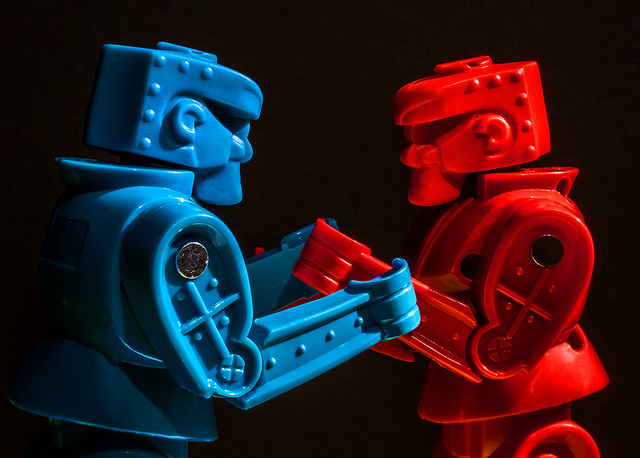
“Ruin is a gift. Ruin is the road to transformation” ~ Elizabeth Gilbert
~
Like many liberals, I have been making the rounds through the five stages of grief over the past several days.
If you need a psych 101 refresher, they’re: denial, anger, bargaining, depression, and acceptance.
I’m not ashamed to admit that I’ve done some things in the earlier stages that I’m not proud of. I called the guy I was on a first date with an “idiot” when he predicted that Trump would win. (Who’s the idiot now?) I found myself picking fights with my like-minded and equally grieving friends.
I then decided to start a “kindness bomb” movement in an effort to counteract all of the negativity (inside and outside of myself). Not a terrible idea until, disappointed by the lack of immediate enthusiasm, I started bullying people (mostly my friends and family) into doing it. Some of them acquiesced to my demands for immediate acts of kindness. (Thanks, friends.) Others gently reminded me that my approach may slightly undermine the whole point. (Thanks, friends.)
Anyway, a few bumps in the road notwithstanding, I have finally approached acceptance and am able to address the whole situation a tad more rationally. To that end, here is a warning: if you are still entrenched in the anger stage (due to the election or for any reason, really) stop reading this and go be angry. You have to get through that phase before any of this is going to make sense. It is also going to further piss you off because I have some nice things to say about Trump voters. You have been warned.
During one of the stages, I forget which one but it involved a lot of carbs and a subsequent stomach ache of epic proportions, I tried to relax and turn my brain off by watching the rom-com, Eat, Pray, Love. (I highly recommend the book and to a lesser but still significant extent, the movie.) Incidentally, I was reminded of the following wise and relevant quote from Elizabeth Gilbert, “Ruin is a gift. Ruin is the road to transformation.”
And I realized that if we ever hope to transform these ruins of a polarized country, we have to start by asking, “what do we have in common?”
If this election taught us anything, it’s that remaining in our liberal bubble is counterproductive, at best, and dangerous, at worst. It is certainly not going to teach us anything new. So with that in mind, I set out to interview some Republicans, specifically Trump voters.
I am vocal about my political beliefs, which are pretty much as far left as one can go before bumping into China. I also openly and proudly write regularly for the socially progressive online publication, elephant journal. The Trump voters I reached out to had every reason to decline my invitation to talk. But many of them didn’t. And I appreciate that so much.
Through these discussions, among other things better saved for another article or two, I learned of several similarities we have between us.
Here are a few:
1. We are all scared.
Several Trump voters stated that they were afraid that hundreds of thousands of refugees would be permitted access into the country and that this might compromise our national security. Some stated they voted for Trump because a vote for Hilary might jeopardize their job in some way. I’m not debating the facts or validity of any concern. That’s not the point. The point is, we are all in a scary place and fear is influencing our decisions. Whether you’re scared because your civil rights are somehow still a debate or you are hanging onto your job by a thread and the notion that more people will be clamoring for any job that you may one day need in order to feed your family terrifies you. We are all scared.
2. People of both sides comprise 99 percent of the country that has been economically disenfranchised.
Ninety-nine percent of us are victims of a system that empowers one percent of the country to have profound control over our daily lives. Regardless of what side you are on, let that sink in. Let that piss you off as much as it should. And when you make it to the acceptance stage of that grief process, consider working toward uniting your fellow 99 percenters against the common enemy.
3. Other than a diagnosed sociopath who doesn’t have the ability to care about others, which is only one to two percent of the population, we all care about other people, with this qualifier: Our basic needs and those of our loved ones always come first.
If you think that one candidate is going to protect your ability to feed your family, but might adversely impact your neighbor’s ability to marry their partner, you are likely going to choose in favor of the basic needs of your family. Our ability to be compassionate toward our neighbors is profoundly impaired when we are scared for ourselves and our families. We always have to put our oxygen masks on first before we can help anyone else. Once our own basic needs are met (see number two), we can focus on the needs of our neighbors.
4. We all live in our own respective bubbles and are therefore undereducated.
We can read everything ever written on a topic but unless we actually speak openly with someone with another point of view, we are not getting the full story.
5. We both feel unheard.
There are big differences on how we conceptualize privilege and racism. But the bottom line is that both groups “feel” (I’m not debating facts—feelings are always valid) unheard. Liberals feel that dominant, privileged groups overtly and covertly stifle the opportunities of disenfranchised groups of people. Women, people of color, the LGBTQ community, and immigrants feel stifled, disregarded, and marginalized. Republicans feel that liberals shut down any conversation that might be considered “offensive.” One Trump supporter I spoke with noted, “I was scared to criticize Obama for eight years out of fear I would be labeled racist…” No one feels heard.
A final note:
Some fellow liberals may contend that rather than focusing on finding common ground, our efforts would be better spent fighting tooth and nail that this is #notourpresident. Here is a newsflash: We can do both. Here is another one: If we don’t, if we keep with the status quo of shutting one another out, four years from now, Trump or some other version of him will be elected again. And next time, it might even be by the majority.
~
Author: Jenny Spitzer
Image: Robert Couse-Baker/Flickr
Editor: Catherine Monkman










Read 1 comment and reply